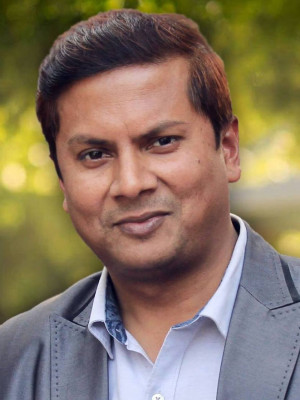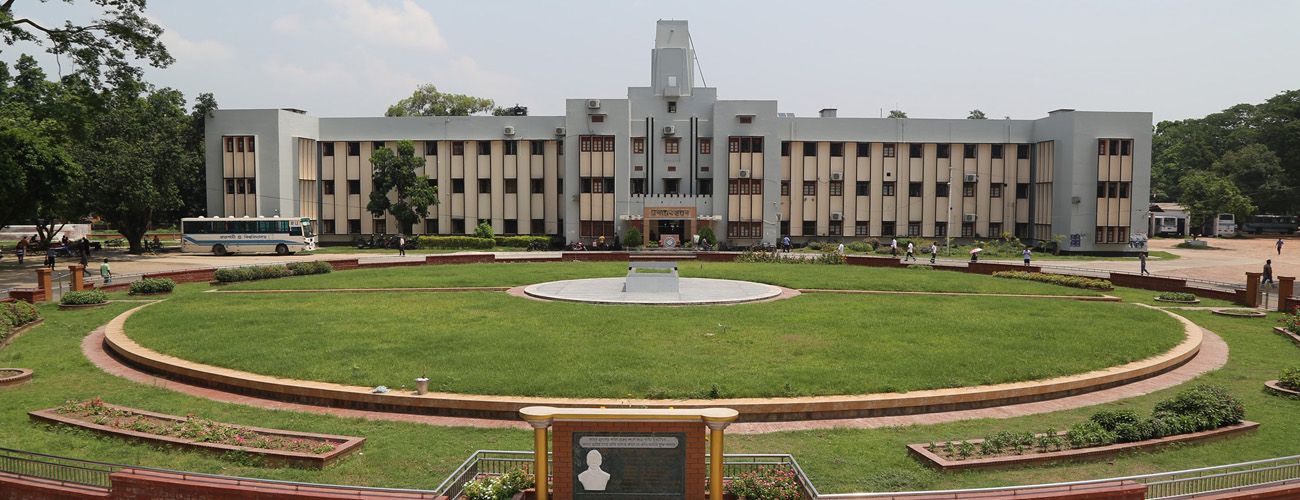Message from Chairman
The Department of Mass Communication and Journalism (MCJ) of Rajshahi University is
one of the leading centers in Bangladesh for teaching-learning and research in the field of
communication, media and culture. It is the second oldest academic institution in the country
opened to study and research in this specified discipline, developed with the essences of
different branches of knowledge like social science, psychology, philosophy, anthropology,
linguistics, history and much more.
The first priority of DoMCJ is to equip students for meaningful lives and productive
careers. For accomplishment of this, students are provided with the opportunity to acquire a
liberal education to the extent of their abilities, achieve competence in their discipline,
explore the significant issues confronting society, and develop a heightened sense of
responsible citizenship.
Keeping this in mind, the academic program at DoMCJ is aimed to:
-be responsive to the needs of students in a rapidly changing society and to new
developments in the understanding of communication, media and society;
– assist students to become mature adults capable of continuous self-education;
-develop awareness of self, others, and the environment;
– develop understanding of various approaches to knowledge;
– develop the ability to choose values critically.
Established in 1992, the Department of Mass Communication and Journalism has
long been recognized as a leader in journalism education in Bangladesh. The School has
produced thousands of distinguished graduates. The BSS and MSS programs prepare students
for dynamic careers in many traditional and new fields—working in media industries, or in
other industries but within communications, and as entrepreneurs.
At present almost two hundred and fifty students are engaged in learning the
discipline of Mass Communication and Journalism. Around 200 Under-Graduate and 50 are
Post-Graduate students comprises the number. It may not be left to mention that some
students are doing M. Phil and PhD research in this department.
Many of the former students of this department are now working efficiently in almost
all the leading national newspapers, such as Prothom-alo, Samakal, Kaler Kantha, Ittefaq etc.,
television channels such as NTV, Jamuna TV, Somoy TV, Independent TV, Channel 24,
Maasranga TV, Channel I, ATN, ATN news etc., online news portals. Many are working at
radio channels, news agencies of the country and at different local news media.
Former students of this department are now serving in different Government offices,
international organizations, multi-national companies, development sectors, NGOs and
corporate houses is also considerable.
The department has been giving leadership in the sphere of cultivation of University
based unrestrained thought and free intellect. The spirited role of this department in the
political catastasis and towards establishment of democracy in the country has been
nationally recognized. It is of immense pride that this department is a befitting brother-in-
arms of the students and the teachers of other public universities of the country who created
glorious history, the elements being their courageous role and self-sacrifice dedication at time
of all progressive movements and transitional periods and crisis of the soil and the nation.
one of the leading centers in Bangladesh for teaching-learning and research in the field of
communication, media and culture. It is the second oldest academic institution in the country
opened to study and research in this specified discipline, developed with the essences of
different branches of knowledge like social science, psychology, philosophy, anthropology,
linguistics, history and much more.
The first priority of DoMCJ is to equip students for meaningful lives and productive
careers. For accomplishment of this, students are provided with the opportunity to acquire a
liberal education to the extent of their abilities, achieve competence in their discipline,
explore the significant issues confronting society, and develop a heightened sense of
responsible citizenship.
Keeping this in mind, the academic program at DoMCJ is aimed to:
-be responsive to the needs of students in a rapidly changing society and to new
developments in the understanding of communication, media and society;
– assist students to become mature adults capable of continuous self-education;
-develop awareness of self, others, and the environment;
– develop understanding of various approaches to knowledge;
– develop the ability to choose values critically.
Established in 1992, the Department of Mass Communication and Journalism has
long been recognized as a leader in journalism education in Bangladesh. The School has
produced thousands of distinguished graduates. The BSS and MSS programs prepare students
for dynamic careers in many traditional and new fields—working in media industries, or in
other industries but within communications, and as entrepreneurs.
At present almost two hundred and fifty students are engaged in learning the
discipline of Mass Communication and Journalism. Around 200 Under-Graduate and 50 are
Post-Graduate students comprises the number. It may not be left to mention that some
students are doing M. Phil and PhD research in this department.
Many of the former students of this department are now working efficiently in almost
all the leading national newspapers, such as Prothom-alo, Samakal, Kaler Kantha, Ittefaq etc.,
television channels such as NTV, Jamuna TV, Somoy TV, Independent TV, Channel 24,
Maasranga TV, Channel I, ATN, ATN news etc., online news portals. Many are working at
radio channels, news agencies of the country and at different local news media.
Former students of this department are now serving in different Government offices,
international organizations, multi-national companies, development sectors, NGOs and
corporate houses is also considerable.
The department has been giving leadership in the sphere of cultivation of University
based unrestrained thought and free intellect. The spirited role of this department in the
political catastasis and towards establishment of democracy in the country has been
nationally recognized. It is of immense pride that this department is a befitting brother-in-
arms of the students and the teachers of other public universities of the country who created
glorious history, the elements being their courageous role and self-sacrifice dedication at time
of all progressive movements and transitional periods and crisis of the soil and the nation.


